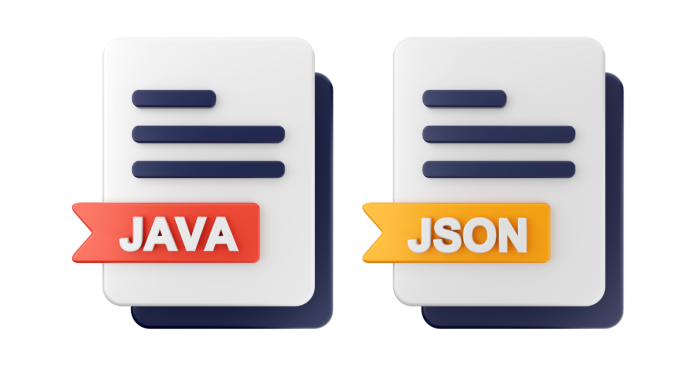Converting a Java object to JSON is a common task in Java development, often needed when working with APIs or persisting data in a readable format. Libraries like Jackson, Gson, or org.json simplify this process.
1. Using Jackson Library
The Jackson library is a widely-used library for JSON processing in Java.
Steps:
- Add the Jackson library to your project.
- For Maven:
<dependency> <groupId>com.fasterxml.jackson.core</groupId> <artifactId>jackson-databind</artifactId> <version>2.15.2</version> <!-- Use the latest version --> </dependency>
- For Maven:
- Convert the Java object to JSON.
import com.fasterxml.jackson.databind.ObjectMapper; public class Main { public static void main(String[] args) throws Exception { // Example Java object Person person = new Person("John", 30, "Engineer"); // Create ObjectMapper instance ObjectMapper objectMapper = new ObjectMapper(); // Convert Java object to JSON string String jsonString = objectMapper.writeValueAsString(person); // Print JSON string System.out.println(jsonString); } } // Example Java class class Person { private String name; private int age; private String profession; // Constructor, Getters, and Setters public Person(String name, int age, String profession) { this.name = name; this.age = age; this.profession = profession; } // Getters and setters (optional for Jackson) }
Output:
{"name":"John","age":30,"profession":"Engineer"}
2. Using Gson Library
The Gson library, developed by Google, is another popular choice for JSON serialization.
Steps:
- Add the Gson library to your project.
- For Maven:
<dependency> <groupId>com.google.code.gson</groupId> <artifactId>gson</artifactId> <version>2.10.1</version> <!-- Use the latest version --> </dependency>
- For Maven:
- Convert the Java object to JSON.
import com.google.gson.Gson; public class Main { public static void main(String[] args) { // Example Java object Person person = new Person("Alice", 25, "Doctor"); // Create Gson instance Gson gson = new Gson(); // Convert Java object to JSON string String jsonString = gson.toJson(person); // Print JSON string System.out.println(jsonString); } } // Example Java class class Person { private String name; private int age; private String profession; public Person(String name, int age, String profession) { this.name = name; this.age = age; this.profession = profession; } }
Output:
{"name":"Alice","age":25,"profession":"Doctor"}
3. Using org.json Library
The org.json library is a simple way to convert objects to JSON.
Steps:
- Add the library to your project.
- For Maven:
<dependency> <groupId>org.json</groupId> <artifactId>json</artifactId> <version>20230227</version> <!-- Use the latest version --> </dependency>
- For Maven:
- Convert the Java object to JSON.
import org.json.JSONObject; public class Main { public static void main(String[] args) { // Example Java object Person person = new Person("Mark", 40, "Teacher"); // Convert Java object to JSON using JSONObject JSONObject jsonObject = new JSONObject(person); // Print JSON string System.out.println(jsonObject.toString()); } } // Example Java class class Person { private String name; private int age; private String profession; public Person(String name, int age, String profession) { this.name = name; this.age = age; this.profession = profession; } }
Output:
{"name":"Mark","age":40,"profession":"Teacher"}
Which One Should You Use?
- Jackson: Great for most use cases. It has extensive features and works well with complex data structures.
- Gson: Lightweight and easy to use, suitable for simple use cases.
- org.json: Simple and suitable for quick conversions but lacks advanced features.
RELATED ARTICLES
0 Comments
Oldest


